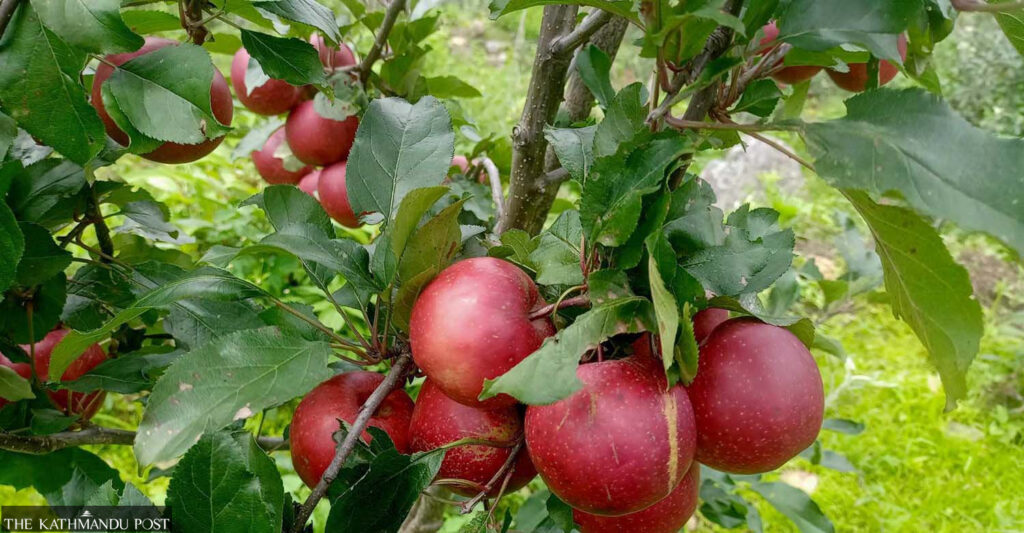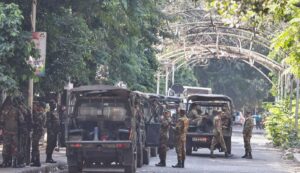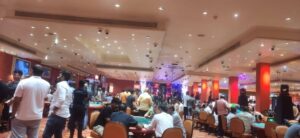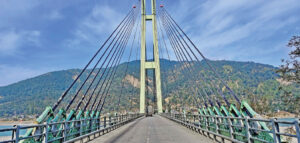
Lakpa Gurung of Shardibas, one of the most inaccessible wards of Chumnubri Country District in Gorkha locale, was anticipating a bumper apple collect this year, much obliged to the copious winter snowfall that filled the trees in his plantation with flowers.
Gurung begun gathering apples two weeks back after they started turning red.
However, he faces a huge issue. Transportation in the southern portion of Gorkha has gotten to be a major issue due to overwhelming storm downpours that have seriously harmed the streets. In spite of the great collect, apple agriculturists like Gurung are profoundly frustrated.
“I have around 400 kg of apples sitting unsold,” said Gurung, who begun an apple cultivate four a long time prior. “It’s been two weeks, and I still haven’t been able to send them to the market.”
This year, he collected over 670 kg of apples from 900 trees in his plantation, which begun creating apples final year. In the to begin with bunch, he collected 200 kg and dispersed them to neighbors and relatives as souvenirs.
“This year, the youthful apple trees yielded 3 to 4 kg of apples per tree. I overseen to offer 200 kg to the inns along the trekking in Philim and Manasulu by carrying them in bamboo bushel on my back,” he said.
He has another 400 kgs of apples put away at home.
“There are still a few apples on the trees,” said Gurung. “If I don’t cull them before long, they will fall,” Gurung said. “But there is no vehicle to transport apples to the market.”
It takes three hours to reach Philim Bazar on foot.
The track to Larke, which was opened in the winter and permitted jeeps, trucks, and tractors to reach Pangsing Pass, one of the courses interfacing the Chinese border in the north, has presently been blocked by visit avalanches and mudslides, especially amid the continuous rainstorm season.
Lapu is the closest station where vehicles are accessible, but it is a day-long climb from his farm.
Apple agriculturists say they have the alternative of transporting apples on the backs of donkeys, but there is a enormous hazard of harming the fruits.
Gurung, who runs Pati Krishi Tatha Pashupanchhi Cultivate, sold apples for Rs250 per kg in the town, but there were few customers.
Villagers say that providing apples to the advertise at this time of year gets a way better price.
Gurung returned to Nepal in 2011 after working as a vagrant in Malaysia and begun animals cultivating and agriculture.
He contributed Rs5 million in his cultivate, which has 600 walnut plants.
Commercial apple cultivating has flourished in zones like Pangsing and Aagasarseu of Shardibas, and in Namrung of Chumnubri Rustic Municipality.
However, need of transportation has cleared out commercial apple cultivators disappointed, as they confront the prospect of losing impressive pay this year fair some time recently Nepal’s greatest festivals—Dashain and Tihar, which drop in October-November.
There are more than 12,000 apple plantations in Namrung.
Lakpa Thendup Lama, who too chosen to lock in in apple cultivating four a long time prior in Namrung, is confronting a intense year.
“This year, apple surrender has multiplied, and collecting has as of now begun,” Lama said. But, the need of transportation has hosed his spirits.
Last year, as well, we sold our apples to visitors and lodgings in the Manasulu area.” Lama reviewed. He had trusted to get a great cost for his apples by providing them to the markets, but has not been able to do so.
He plans to turn the unsold apples into sukuti (dried natural product). He has branded the natural product as ‘Chumnubri Apple’.
It takes around three days to reach Arughat from Namrung.
“Jeeps utilized to work in Pangsing, but with the streets in destitute condition, they are presently purge, and so is our business,” Lama said.
Related
‘Chinese spy mayor’ needed by Philippines arreste





